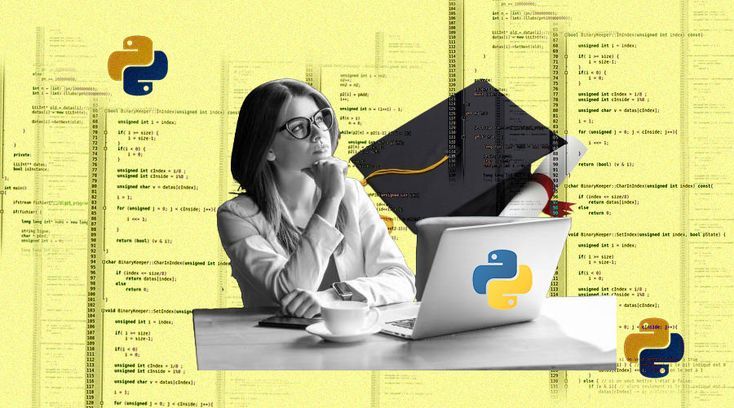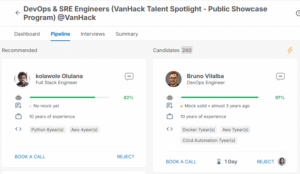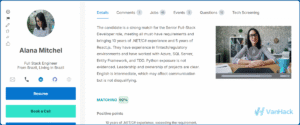Scaling startups often struggle to hire qualified Python developers quickly enough to keep up with growth. Traditional hiring methods can take 3 to 6 months per role, delaying product development and weakening competitive edge. Streamlining your Python hiring process helps deliver features faster, strengthens system architecture, and supports sustainable team expansion. Start recruiting with Vanna now to speed up your search for top talent.
Why Hiring Python Developers Is Tough for Startups
The demand for Python developers has surged, creating a tight talent market. Senior Python developers in 2025 need deep knowledge of concepts like decorators, closures, and memory management to build scalable code. This level of expertise makes it hard for startups to evaluate candidates accurately with standard screening tools.
The talent shortage grows when you factor in the need for leadership. Senior developers often mentor junior staff, requiring strong collaboration skills alongside technical ability. Startups need developers who can code, guide architecture, and scale processes effectively.
Standard hiring methods fall short, relying on resumes and basic questions that don’t show a candidate’s real potential. Employers value developers who apply advanced Python features to practical projects, not just basic coding. This disconnect between resumes and actual needs creates a persistent hiring gap.
Get Ready to Hire: Key Steps Before Recruiting Python Developers
Set Up the Right Tools and Systems
Prepare your infrastructure before starting the search for Python developers. Use an applicant tracking system to organize candidates, video platforms for remote interviews, and coding tools for technical tests. Also, have compensation benchmarking tools ready to craft competitive offers fast.
Align Your Team and Resources
Gain the necessary approvals before kicking off hiring. Secure access to HR systems, budget for salaries and possible relocation costs, and get agreement from engineering leaders, product teams, and executives. Clear decision-making power keeps the process moving quickly.
Define the Exact Role Needs
Pinpoint the type of Python developer your startup requires. Skills vary by industry, backend roles need Django, Flask, and database expertise, data science roles require NumPy and machine learning tools, while automation focuses on cloud platforms. Knowing these specifics helps target the right talent.
Plan for Time and Challenges
Expect to spend 40 to 60 hours of internal team time per hire when handling it in-house. This covers sourcing, screening, interviews, and decisions. The process is tough due to high competition and technical demands in the market.
Understand the Business Benefits
Quick and effective hiring of Python developers boosts startup growth. Shorter hiring timelines speed up feature releases, improve scalability, and provide a competitive edge. Strong hires also increase team output and reduce future hiring needs through better retention.
Your Guide to Hiring Python Developers Quickly
Step 1: Target the Right Senior Python Talent
Start by outlining a clear candidate profile. In 2025, startups expect senior Python talent to handle advanced frameworks for high-performance apps. Specify required skills, experience, and responsibilities.
Key actions to take:
- Detail necessary frameworks like Django, Flask, or FastAPI.
- Set experience levels, often 5-10 years for senior roles.
- Identify domain needs such as fintech or healthcare.
- Clarify mentoring and architecture duties.
This creates a focused job description that draws in qualified applicants and filters out mismatches, leading to better candidate quality.
A useful tip: Look into international markets, especially Latin America, where skilled Python developers are available at competitive rates. This strategy can cut costs without sacrificing quality.
Step 2: Assess Technical Skills Efficiently
Resume screening alone doesn’t reveal a candidate’s true ability. Companies often use detailed interviews covering data structures, exception handling, and frameworks, but this takes significant time.
Key actions to take:
- Use coding tests based on real-world Python tasks.
- Review video intros to check communication skills.
- Apply AI-driven interviews for consistent scoring.
- Set design challenges for senior-level architecture skills.
Platforms like VanHack simplify this by providing a shortlist of 3 to 5 pre-vetted Python developers. Profiles include video intros, AI interview results, and coding test scores, saving hours compared to manual vetting. This approach leads to faster identification of strong candidates with solid evaluation data.
Step 3: Streamline Interviews and Decisions
Build an efficient interview process. Senior Python developers in 2025 should excel in system architecture and strategic project guidance. Focus on assessing these skills without dragging out the timeline.
Key actions to take:
- Run technical deep-dives on architecture and design.
- Assess team fit with future coworkers.
- Evaluate leadership potential for senior roles.
- Test problem-solving in realistic scenarios.
Avoid overcomplicating interviews. Many startups lose great candidates by stretching the process too long. Keep it to 3 or 4 focused sessions with defined criteria and quick decisions. Aim for a 1 to 2-week cycle that evaluates thoroughly while keeping candidates engaged.
Step 4: Make Strong Offers and Onboard Smoothly
Research market salaries for Python developers, especially in high-demand fields like machine learning. Tailor offers to match expectations for your region or remote setup.
Key actions to take:
- Benchmark pay against local and remote market data.
- Offer equity packages aligned with candidate goals.
- Include relocation support for international hires.
- Highlight growth opportunities in the role.
For global hires, VanHack offers relocation support, managing visas, housing, and logistics to ease the transition. The result is a successful offer acceptance with a clear onboarding plan for your new Python developer. Chat with Vanna now to explore AI-driven recruiting for your Python hiring needs.
Simplify Hiring with Professional Recruiting Services
Following the steps above lays out a solid hiring plan, but executing it takes time and expertise. Most startups lack the internal capacity to source and vet senior Python talent while focusing on core operations.
The Cost of Internal Hiring
Consider the real impact of hiring in-house:
- 40-60 hours of senior team time per hire.
- 3-6 months per role, delaying key projects.
- Limited reach to global talent.
- Inconsistent vetting of technical skills.
- High opportunity cost for engineering teams.
How VanHack Solves Python Hiring Challenges
VanHack streamlines the process with targeted tools and support:
AI matching: Vanna, VanHack’s AI recruiter, connects job needs with profiles from over 500,000 global tech professionals, cutting down manual sourcing.
Thorough vetting: Candidates come with video intros, scored coding tests, and AI interview insights for a complete skills overview.
Cost-effective model: A $3,000/month subscription allows unlimited hires, offering predictable costs for fast-scaling startups.
Relocation help: For international hires, VanHack handles visa processes and logistics, opening access to worldwide talent.
Facing issues with assessing advanced skills? VanHack provides detailed technical reports. Struggling with a small candidate pool? Their global network ensures a steady flow of talent.
Track Success with Clear Hiring Metrics
Set specific goals to measure your Python hiring effectiveness across speed, quality, impact, and cost.
Speed goals:
- Time-to-hire: Aim for 14-21 days from posting to offer.
- Time-to-productivity: New hires coding within 2 weeks.
- Pipeline flow: Steady candidate stream without delays.
Quality goals:
- Technical skills: Expect clean coding, problem-solving, and data structure knowledge from seniors.
- Team fit: High scores for collaboration and integration.
- Retention: 90% or more staying after 12 months.
Business impact:
- Feature speed: Faster delivery of new features.
- Code quality: Better performance, less technical debt.
- Team growth: Effective mentoring of junior staff.
Cost efficiency:
- Cost-per-hire: Track total recruiting expenses.
- Team time: Monitor internal hours spent.
- Acceptance rate: Target 80% or higher for offers.
Next Steps for Building Your Python Team
Structure Your Team Thoughtfully
As you hire Python developers, plan team roles carefully. Senior engineers with both backend and basic frontend skills can manage full web app projects. Mix complementary skills for a balanced team.
Focus on Retention
Keep top talent by offering:
- Challenging projects for technical growth.
- Career paths to lead or principal roles.
- Learning budgets for conferences or courses.
- Innovation time for open-source contributions.
Create a Supportive Community
Build internal groups for knowledge sharing, especially for remote or relocated hires who may need extra connection points.
Scale Your Hiring Process
As your team grows, standardize:
- Interview frameworks for various Python roles.
- Onboarding plans to speed up productivity.
- Performance metrics tailored to Python tasks.
- Integration protocols for remote hires.
Expand to Related Roles
Look beyond Python to complete your team with:
- DevOps for infrastructure automation.
- Frontend to pair with backend skills.
- Data engineers for analytics setups.
- Product engineers for business-tech alignment.
Keep Improving Your Approach
Regularly refine hiring by:
- Tracking conversion rates at each stage.
- Collecting feedback from new hires.
- Following industry trends in Python skills.
- Comparing performance to market standards.
Stay Updated on Tech Trends
Monitor emerging tools impacting Python work:
- AI frameworks needing specific skills.
- Cloud-native and container expertise.
- API practices for microservices.
- Security needs for production apps.
Soft skills like communication and analytical thinking help senior developers thrive in teams. Balance technical and teamwork abilities as you grow.
Common Questions About Hiring Python Developers
How Long Does It Take to Hire a Senior Python Developer?
Timelines depend on your method and market conditions. Internal hiring often spans 3 to 6 months due to sourcing issues and long evaluations. With preparation and a recruiting partner, this can shrink significantly. Factors like specific skill needs, competitive pay, and efficient vetting affect speed.
What Are Typical Salary Ranges for Python Developers in 2025?
Salaries differ by experience, focus area, and location. Senior Python developers in North America often earn $120,000 to $180,000 base pay, plus equity. Global talent pools can lower costs while keeping quality high. Specialties like machine learning or fintech demand higher rates. Include benefits and growth options in your offers.
Should I Hire Remote or Local Python Developers?
Remote hiring widens your talent options and can save costs while accessing niche skills. Consider time zones, communication setup, and team fit. Many startups succeed with mixed local and remote teams. For remote hires, prioritize strong communicators with prior remote experience and provide tools for collaboration.
What Technical Skills Matter Most for Python Candidates?
Focus on practical skills over theory. Key areas include framework experience, database handling, API building, and system design. Use coding challenges that reflect your real-world needs. For senior roles, communication is vital to explain complex ideas and mentor others effectively.
How Do I Assess Leadership in Python Developers?
Senior developers need technical and leadership strengths. Use behavioral questions to explore past project guidance, conflict resolution, and mentoring. Check for code review habits and knowledge sharing. Contributions to open source or conferences signal thought leadership. Look for a mix of deep technical skill and strategic vision.
Wrap-Up: Build Your Startup with Top Python Talent
Hiring Python developers quickly demands a focused strategy balancing speed, quality, and cost. Old methods like job boards and drawn-out interviews don’t match the urgency of growing startups. Structured processes, global talent access, and advanced vetting tools help build strong Python teams fast.
Success starts with clear planning, defined needs, and smooth execution. Whether building in-house hiring or using specialized services, prioritize candidates with technical skill, teamwork, and growth potential.
VanHack’s AI platform, Vanna, aids Python hiring with pre-vetted talent, detailed assessments, and relocation support. A $3,000/month subscription covers unlimited hires, ensuring access to skilled professionals.
Demand for Python developers will keep rising across industries. Startups that refine their hiring gain an edge with quicker product releases, stronger tech capacity, and solid team foundations for growth. Start hiring with Vanna today to boost your startup’s technical progress.



